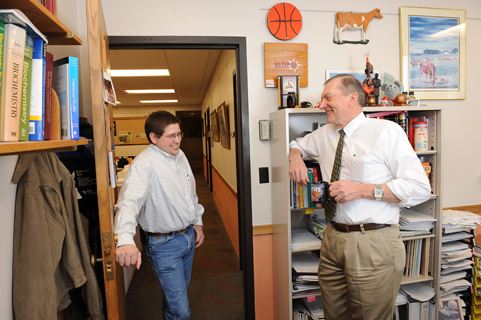
Beitz Knows Student Advising

Matthew O’Neil, graduate student in nutritional sciences, chats with Charles F. Curtiss Distinguished Professor Don Beitz. Beitz, co-creator of the agricultural biochemistry major, is known for creating a warm and welcoming environment and tailoring his advising style to meet students’ unique needs.
After his first semester at the University of Illinois, freshman Don Beitz walked into his adviser’s office to register for second-semester classes. His adviser pointed a finger at him and said, “Beitz! You’re going to graduate school!”
Beitz, who described himself as a rather timid new college student, said: “What’s graduate school?” His adviser told him; it meant he’d be taking a lot more math, chemistry and physics. Beitz liked the sound of that; he excelled in all those.
Then his adviser pointed his finger again. He pointed down the hallway, where he told Beitz to go see a colleague and ask for a job working in his research lab.
Beitz listened and took both suggestions. He also learned a lesson in advising students that he’s used many times in his 45 years on the Iowa State faculty.
“My adviser got to know me, took me under his wing and helped me. He was relatively forward in making his suggestions, which I needed. And he knew I needed that. It’s a style I’ve tried to mimic. After I get to know a student, I’ll throw out some ideas. With some students, you just try to stay out of their way. With others, you need to lead more.”
“I try to motivate students for excellence,” says Beitz. “I always tell them: Good grades have never hurt anybody. Be the best you can be while you’re in college. You’ve got to be totally honest with them and have the highest integrity possible. I’ve never had locked office doors. I do whatever I can to ensure I don’t spoil anyone’s trust in me.”
Beitz is a Charles F. Curtiss Distinguished Professor of Agriculture and Life Sciences in animal science and in biochemistry, biophysics and molecular biology. When he won the prestigious Morrison Award for outstanding research from the American Society of Animal Science in 2010, Beitz estimated he’d taught more than 11,000 students and directed 94 advanced degree programs. Those numbers have grown in two years and continue to grow.
Beitz has sustained a remarkable enthusiasm for education, research and establishing lifelong ties with his students. He thinks of his students, past and present, as extended family.
One of those “family members” is Kim Buhman (’92 ag biochemistry), an associate professor of nutrition scienc eat Purdue University.
“From Dr. Beitz, I learned a lot about the importance of being active, enjoying life and being inquisitive in whatever you do,” Buhman says. “But his role as a lifelong mentor is what I treasure most. He continues to introduce me to new people, helps me to identify opportunities I haven’t imagined before and offers suggestions and support when I need it most. His strong passion for people, science and knowledge created this network that has served so many. Dr. Beitz is a gem.”
Beitz says it’s simply a joy to help students find something they’re excited about and will love to do after college. “It makes me feel good at heart.”
For more than 25 years, Beitz has taught a seminar for freshmen with a focus on science, biotechnology, DNA and biochemistry. Near the start of the freshman seminar, he talks about defining life on chemistry terms.
“I tell them the difference between life and death is a sodium pump. Students just look at me. So I explain how our bodies take fuel, burn it and make ATP. We use ATP to keep sodium out of our cells so we have a gradient. As long as that sodium pump is working, the brain functions. As soon as that gradient disappears, the brain dies. We have some great discussions. It’s amazing how much interest you generate when you start talking about whether you are what you eat.”
Beitz considers himself the most fortunate guy in the world. As he was completing his graduate degree at Michigan State and about to accept a job offer in another state, he got a phone call from Norm Jacobson at Iowa State. Jacobson, a dairy nutrition physiologist, invited him to interview for a faculty position that was half animal science, half biochemistry. After the interview, Beitz was offered the job and accepted immediately.
“It was a perfect fit. We had a great set of faculty members in the nutritional physiology program. We started the agricultural biochemistry major. I believe strongly that we need to train students in the fundamental sciences so they can apply them to agriculture. It’s what I’ve loved about my own research.”
His research has covered cholesterol issues in animals and humans; nutritional and genetic control of the composition of milk and meat; and a deeper understanding of the causes and potential treatment of fatty liver and ketosis in dairy cattle.
Beitz says his biggest contribution to research has been on what animal scientists can do to improve animal products for humans. “Animal scientists should think more about the composition of products. We need to think about producing the desired composition for the consuming public.”
But Beitz’s pride and joy has been all the students he’s known, worked with and kept track of after they leave ISU.
“My freshman seminar meets in a room in Kildee Hall that has portraits of past animal nutrition faculty. I like to talk about each person and what they did. Students should know about the people looking down on them from the walls. One day, a student told me, ‘I want my picture up there someday.’ That was just great to hear. It really was.”
STORIES ONLINE EXTRA: Alumni share their thoughts on Beitz http://stories.cals.iastate.edu/2012/06/beitz-caring-mentor-contagious-positive-spirit/



